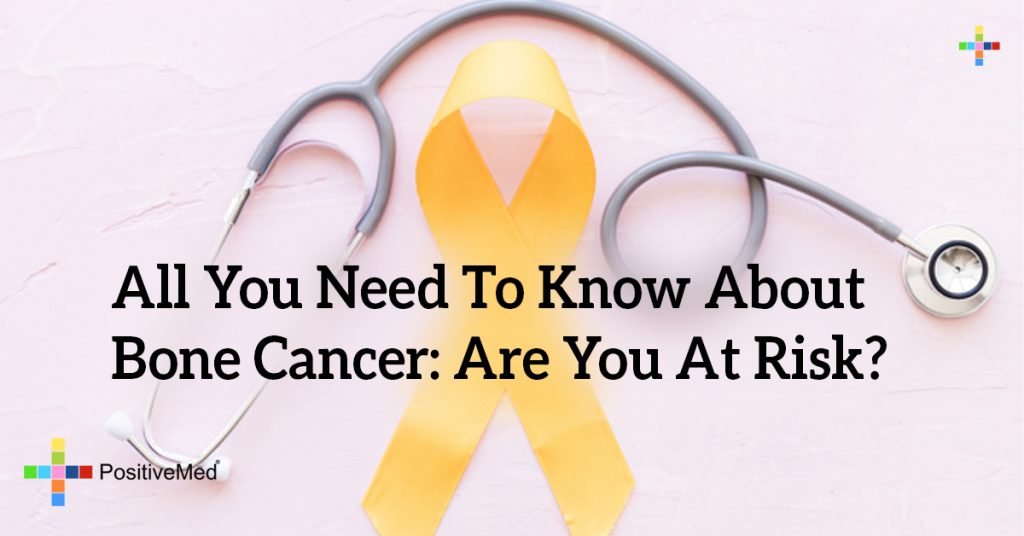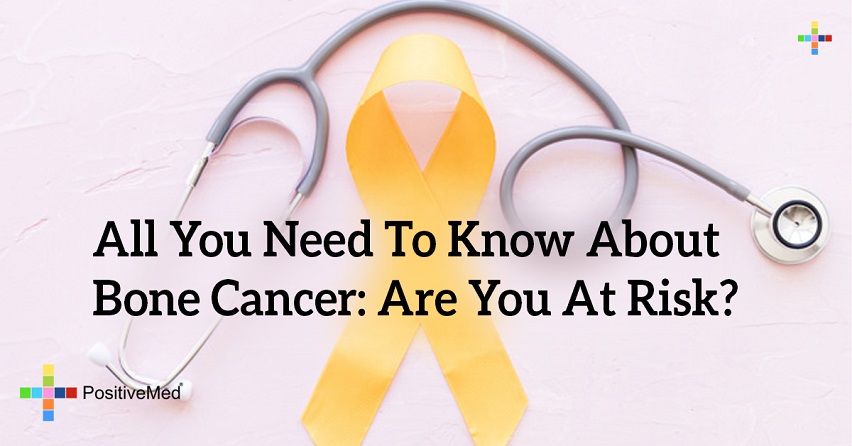
All You Need To Know About Bone Cancer: Are You At Risk?
Cancer comes in many faces, confronting people with no discrimination. One out of every two men and one out of every three women will be affected, meaning it’s virtually impossible for someone to not know anyone who isn’t suffering from the disease in one form or another.

Bone cancer, one of the cancer’s rarer forms, makes up less than one percent of all cancers. Behind heart disease, it is the second leading cause of death in the U.S.; a malignant tumor of the bone that destroys healthy bone tissue, resulting in some abnormal growth. While it can affect any bone in the body, it usually targets the lengthier bones in the arms and legs.
Malignant tumors that begin in bone tissue are what is known as primary bone cancer. Cancer that spreads to the bones from other parts of the body is called metastatic cancer. It is worth noting that not all bone tumors are malignant. As a matter of fact, benign bone tumors are far more common than those that are malignant. While malignant and benign tumors are capable of growing and compressing against strong bone tissue, benign tumors do not spread or destroy bone tissue and are rarely threatening to live.
Detection of Bone Cancer
In order to identify bone cancer, a doctor will remove a portion of bone tissue from the tumor for further examination. It will tell the doctor whether or not it is primary bone cancer, or rather, cancer that started elsewhere and eventually spread to the bone. This is the most efficient way to determine if the tumor is cancerous.
Different Forms of Bone Cancer
• Osteosarcoma – most common form of bone cancer. Originates in the bone cells of a person’s arms, legs or pelvis. Usually occurs in persons between the ages of 10 and 30, and most common in males.
• Chondrosarcoma – forms in cartilage cells; a second most common form of bone cancer. Rarely occurs in people under the age of 20. Chances of contracting increase with age.
• Ewing tumor – starts in the bones, but can also form in other tissues and muscles; third most common form. Mostly occurs in children and teenagers; rarely seen in adults older than 30.
• Fibrosarcoma – develops in the soft tissue that surrounds bones (tendons, ligaments, fat or muscle). Affects older adults.
• Chordoma – a slow growing tumor with a low risk of spreading throughout the body. Affects bones in the spine and at the base of the skull; affects adult males 30 years and older.
Risk Factors (Who’s at risk)
While a very small number of bone cancers are hereditary, there are certain genetic syndromes that can be passed through families, and subsequently, increase the risk of bone cancer including:
• Li-Fraumeni syndrome
• Retinoblastoma
• Paget’s disease of bone.
RELATED ARTICLE: THIS Vitamin Can Stop Cancer Cell Growth, And We Need MUCH MORE Than Doctors Think
Paget’s disease of bone usually occurs in older adults and increases the risk of bone cancer development. Any previous radiation treatment (i.e. chemotherapy) for other conditions people lead to a higher risk of developing bone cancer in the future.

Symptoms
• Bone pain – this is often the first symptom and the most severe. Any bone can be affected, but it usually targets the lower back, the pelvis, and the ribs. The pain is persistent, growing worse with movement. While pain is usually the first sign to look for, it is worth noting that not all bone cancers cause pain.
• Fractures – affected bones may easily break following a mild injury.
• Nerve compression – occurs when there are fractures of the bones surrounding the spinal cord. Causes weakness in muscles of the legs, numbness of the body, as well as bladder and bowel issues.
• Hypercalcaemia – occurs when there is a high level of calcium in the blood because of a bone breaking down. Can make a person extremely thirsty, nauseous, dehydrated, constipated, or develop kidney damage.
Natural Remedies/Bone Cancer Prevention
• Calcium – an effective form of preventing bone deterioration. Calcium supplements are part of a balanced diet that also help lower the risk of contracting bone cancer later on in life. The recommended dietary allowance is 1,000 milligrams for adults between the ages of 19 to 50. Daily servings of low-fat milk and other dairy products will suffice.
• Strontium – this nutrient helps the body convert calcium into its most useful form in order to preserve healthy bone.
• Magnesium – helps the body get the most out of calcium and also promotes bone health.
• Omega-3 – helps stop the deterioration of the bones, which serves as an effective means of treating bone cancer.
• Sweating helps rid the body of toxins that can only be removed via the sweat glands. The best way to do this is through daily exercise, sauna baths, hot showers, hot tea, as well as eating cayenne pepper.
• Try implementing, at least, five to seven servings of fruits and vegetable each day, foods that are high in fiber, such as whole-grain bread and cereals. Also, make an effort to eliminate fats from your diet.
Conclusion
Currently, there are no definite means to prevent bone cancer, nor is there a cure. Therefore, early detection is the best hope for the possibly of a successful treatment. It is encouraged that people with known risk factors make regular visits to a doctor. Still, most bone cancer occurs in people with no known risk factors.






